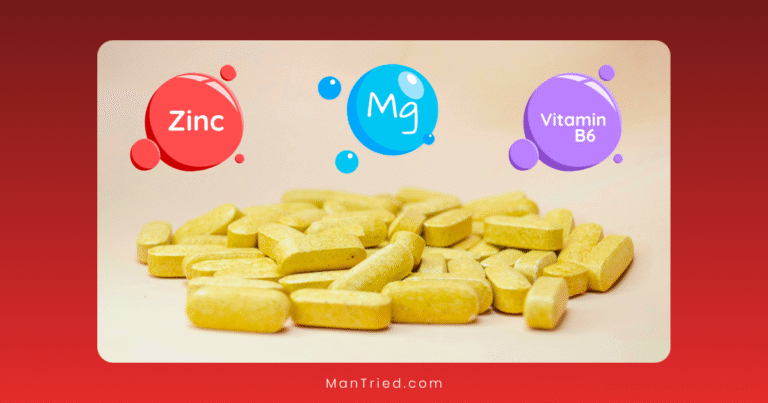Vitamin D Deficiency and ED: The Surprising Connection

When it comes to erectile dysfunction (ED), most discussions center around cardiovascular health, testosterone levels, or psychological factors. However, emerging research has uncovered a surprising player in male sexual health: vitamin D. This essential nutrient, often called the “sunshine vitamin,” appears to have a significant impact on erectile function—one that many men and even healthcare providers might be overlooking.
With ED affecting approximately 52% of men aged 40-70 in the United States and vitamin D deficiency reaching pandemic proportions globally, understanding this connection could offer new hope for millions of men struggling with sexual performance issues. Let’s explore the science behind this relationship and what it might mean for treatment approaches.
The Prevalence Problem: Two Common Conditions
Before diving into the connection, it’s worth noting just how common both of these conditions are:
Erectile Dysfunction: More Common Than You Think
Erectile dysfunction—the inability to achieve or maintain an erection sufficient for satisfactory sexual performance—is extraordinarily prevalent:
- Affects 30% of European males aged 40-79
- Impacts 52% of American men aged 40-70
- Increases significantly with age, reaching up to 90% prevalence in men over 70
- Often goes undertreated, with only about 25% of affected men seeking medical help
Vitamin D Deficiency: A Global Health Issue
Similarly, vitamin D deficiency has reached alarming levels worldwide:
- Affects over 50% of the global population
- Even more prevalent in northern latitudes with less sun exposure
- Particularly common in older adults, the overweight, and those with limited sun exposure
- Often undiagnosed due to subtle or nonspecific symptoms
The overlap between these two conditions is striking and has prompted researchers to investigate whether there might be a causal relationship rather than mere coincidence.
The Scientific Evidence: More Than Just Correlation
The link between vitamin D and erectile function isn’t merely theoretical—it’s backed by a growing body of scientific evidence:
Epidemiological Studies
Multiple population studies have found significant associations between vitamin D status and erectile function:
- A cross-sectional analysis of 3,390 U.S. men found that those with vitamin D deficiency (<20 ng/mL) had a significantly higher prevalence of ED compared to those with optimal levels
- Men with vitamin D levels above 35 ng/mL showed decreased prevalence of ED
- The severity of ED correlates with the degree of vitamin D deficiency
Laboratory and Animal Research
Recent laboratory studies have moved beyond correlation to establish causation:
- A groundbreaking study published in 2025 demonstrated that vitamin D-deficient rats developed erectile dysfunction
- Vitamin D receptor (VDR) knockout mice showed similar ED characteristics
- Penile tissue from vitamin D-deficient animals showed 40% more collagen deposits, indicating increased fibrosis—a known contributor to ED
Human Tissue Studies
Perhaps most compelling are studies examining human penile tissue:
- Human corpora cavernosa (the spongy erectile tissue of the penis) from donors with low plasma vitamin D exhibited reduced nitric oxide-dependent erectile function
- These tissues showed increased levels of oxidative stress markers
- The response to standard ED medications was diminished in tissue samples from vitamin D-deficient donors
These multi-level findings—from population studies to cellular mechanisms—provide strong evidence that vitamin D plays a crucial role in maintaining erectile function.
How Vitamin D Affects Erectile Function: The Mechanisms
Understanding exactly how vitamin D influences erectile function requires looking at several interconnected pathways:
1. Endothelial Function and Nitric Oxide Production
The most well-established mechanism involves endothelial function—the health of the cells lining blood vessels, including those in the penis:
- Vitamin D receptors are abundant in endothelial cells
- Vitamin D stimulates the production of nitric oxide (NO), the primary molecule responsible for penile erection
- NO causes smooth muscle relaxation in the penis, allowing blood to flow in and create an erection
- Vitamin D deficiency reduces NO production and impairs this process
According to a comprehensive review, “Vitamin D plays a significant role in maintaining endothelial integrity and function, which is crucial for erectile function.”
2. Oxidative Stress and Inflammation
Recent research has uncovered another critical mechanism:
- Vitamin D deficiency leads to increased superoxide (a harmful reactive oxygen species) in penile tissues
- This oxidative stress damages blood vessels and nerves essential for erection
- Vitamin D normally upregulates an important protective protein called secretory leukocyte protease inhibitor (SLPI)
- Without adequate vitamin D, SLPI levels drop, leaving tissues vulnerable to oxidative damage
A 2025 study in the British Journal of Pharmacology found that impaired erectile function in vitamin D-deficient rats could be restored by superoxide scavengers, confirming this oxidative stress mechanism.
3. Testosterone Connection
Vitamin D also influences erectile function through hormonal pathways:
- Vitamin D levels positively correlate with testosterone levels
- Men with vitamin D deficiency often have lower testosterone
- Vitamin D supplementation has been shown to increase testosterone production in some studies
- Optimal testosterone levels are essential for libido and erectile function
4. Penile Tissue Remodeling
Long-term vitamin D deficiency can cause structural changes in the penis:
- Increased penile fibrosis (scarring)
- Reduced elasticity of erectile tissues
- Diminished capacity for blood flow
- These changes can make ED more resistant to standard treatments
Vitamin D Deficiency and ED Treatment Resistance
One of the most clinically significant findings is that vitamin D deficiency may explain why some men don’t respond to conventional ED treatments:
- Approximately 30% of men with ED don’t respond adequately to phosphodiesterase-5 inhibitors (PDE5i) like Viagra, Cialis, or Levitra
- Research shows that vitamin D-deficient animals and human tissues have a reduced response to sildenafil (Viagra)
- The 2025 study found that PDE5i were “significantly less effective in restoring erectile function in animals lacking vitamin D”
This suggests that checking vitamin D status might be particularly important for men who haven’t responded well to standard ED medications.
Testing and Optimal Levels: What Men Should Know
Given these connections, vitamin D testing may be valuable for men with ED:
When to Consider Testing
- If you have ED, especially if it’s resistant to standard treatments
- If you have risk factors for vitamin D deficiency (limited sun exposure, darker skin, obesity, older age)
- If you have other conditions associated with low vitamin D (osteoporosis, cardiovascular disease)
Understanding Vitamin D Levels
Vitamin D status is measured through a blood test for 25-hydroxyvitamin D [25(OH)D]:
- Deficient: Less than 20 ng/mL (50 nmol/L)
- Insufficient: 21-29 ng/mL (51-74 nmol/L)
- Sufficient: 30-100 ng/mL (75-250 nmol/L)
- Optimal for erectile function: Studies suggest 36-40 ng/mL may be ideal
Testing Process
- Simple blood test ordered by your healthcare provider
- Can be included in routine bloodwork
- Some direct-to-consumer testing options are also available
- Results typically available within a few days
Supplementation Approaches: Correcting Deficiency
If testing reveals vitamin D deficiency, supplementation may help improve erectile function:
Dosage Guidelines
The appropriate supplementation dose depends on your current vitamin D level:
- For severe deficiency (<20 ng/mL): 50,000 IU once weekly for 6-8 weeks (often by prescription), followed by maintenance therapy
- For mild deficiency (20-30 ng/mL): 2,000-4,000 IU daily for 3-6 months
- For maintenance: 600-2,000 IU daily depending on age and risk factors
Supplementation Forms
Vitamin D supplements come in two main forms:
- Vitamin D3 (cholecalciferol): More effective at raising blood levels, preferred for supplementation
- Vitamin D2 (ergocalciferol): Less potent, often used in prescription high-dose formulations
Most over-the-counter supplements contain D3 in various strengths (400 IU, 1,000 IU, 2,000 IU, 5,000 IU).
Combination with ED Treatments
Some research suggests combining vitamin D with standard ED treatments:
- One study found that men taking both tadalafil (Cialis) and 4,000 IU of vitamin D daily experienced significantly better improvements in erectile function compared to those taking tadalafil alone
- This synergistic effect may be particularly valuable for treatment-resistant cases
Beyond Supplements: Natural Ways to Boost Vitamin D
While supplementation is often necessary to correct deficiency, natural approaches can help maintain healthy levels:
Sunlight Exposure
The body naturally produces vitamin D when skin is exposed to sunlight:
- 10-30 minutes of midday sun exposure several times per week can help maintain levels
- Darker skin requires longer exposure to produce the same amount of vitamin D
- Balance sun exposure with skin cancer prevention (avoid burning)
Dietary Sources
Though few foods naturally contain significant vitamin D, these options can contribute to overall intake:
- Fatty fish (salmon, mackerel, sardines)
- Egg yolks
- Mushrooms exposed to UV light
- Fortified foods (milk, orange juice, cereals)
- Beef liver
Diet alone is rarely sufficient to correct deficiency but can help maintain levels after supplementation.
Vitamin D and Overall Men’s Health: The Bigger Picture
The connection between vitamin D and erectile function is just one aspect of this nutrient’s importance for men’s health:
Cardiovascular Health
- Vitamin D deficiency is associated with increased risk of heart disease
- Cardiovascular health is intimately connected with erectile function
- Improving vitamin D status may benefit both systems simultaneously
Muscle Strength and Performance
- Vitamin D plays a key role in muscle function and strength
- Optimal levels support physical performance and exercise capacity
- This can indirectly benefit sexual performance through improved fitness
Mood and Mental Health
- Low vitamin D is linked to depression and anxiety
- These psychological factors can contribute to erectile difficulties
- Addressing vitamin D status may help alleviate these contributing factors
Who Should Be Most Concerned: Risk Factors for Both Conditions
Certain groups of men should be particularly vigilant about the vitamin D-ED connection:
Older Men
- Both vitamin D deficiency and ED increase with age
- Men over 50 should consider regular vitamin D testing
- Age-related changes in skin reduce vitamin D production from sunlight
Men with Diabetes
- Diabetic men have higher rates of both vitamin D deficiency and ED
- A study of diabetic men found that those with severe ED had significantly lower vitamin D levels
- Vitamin D may help address the endothelial dysfunction common in diabetes
Men with Limited Sun Exposure
- Office workers who spend most daylight hours indoors
- Those living in northern latitudes, especially during winter months
- Men who cover most of their skin for religious or cultural reasons
Men with Obesity
- Excess body fat sequesters vitamin D, reducing its availability
- Obesity is independently associated with both vitamin D deficiency and ED
- Weight loss combined with vitamin D supplementation may offer synergistic benefits
The Future of ED Treatment: Integrating Vitamin D
As research continues to clarify the vitamin D-ED connection, we may see changes in how erectile dysfunction is approached clinically:
Potential Developments
- Routine vitamin D testing for all men with ED
- Vitamin D supplementation as a standard adjunct to ED medications
- Preventive supplementation for high-risk groups
- Development of targeted treatments that address the vitamin D-related mechanisms of ED
Research Horizons
Ongoing and future research is likely to focus on:
- Optimal vitamin D levels specifically for erectile function
- Personalized supplementation protocols based on individual factors
- Combinations of vitamin D with other nutrients that support sexual health
- Long-term studies on whether maintaining adequate vitamin D can prevent ED
Conclusion: A Simple Addition to Your ED Strategy
The connection between vitamin D deficiency and erectile dysfunction represents one of those rare instances in medicine where a relatively simple, low-cost intervention might significantly impact a complex and troubling condition.
While vitamin D supplementation is unlikely to be a magic bullet for all cases of ED, the evidence suggests it could be an important piece of the puzzle—particularly for the millions of men who are both vitamin D deficient and struggling with erectile function.
If you’re dealing with ED, consider these action steps:
- Discuss vitamin D testing with your healthcare provider
- If deficient, follow a proper supplementation protocol under medical guidance
- Maintain healthy levels through a combination of supplementation, sun exposure, and diet
- Continue any prescribed ED treatments, as vitamin D works best as a complement to standard approaches
- Address other lifestyle factors that impact both vitamin D status and erectile function (exercise, weight management, smoking cessation)
By understanding and addressing this surprising connection, you may find an important new avenue for improving not just your sexual health, but your overall wellbeing.






